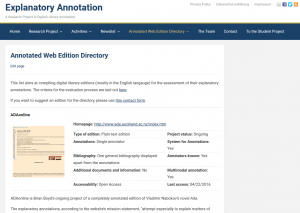 Part of our research in annotation and the development of TEASys is to survey the practice of digital annotation as it is carried out by the many different literary editions and/or software tools available online. One of the results of this work is the Annotated Web Edition Directory. The goal is to create a list of digital editions which incorporate annotation and comment functions together with a short evaluation of the methods brought to bear on the text and its presentation. Our focus rests on the qualitative aspects of annotating literary texts, but in order to map the range of possibilities annotation as a method offers, the directory also includes some examples of other text types (like the Aberdeen Bestiary Project or letter editions like the Carlyle Letters Online). It furthermore lists tools which offer these annotatory functions for working with texts. In a next step, we aim to include some selected examples of how annotation works in relation to other media as happens in new developments to digitally annotate the visual arts or architecture.
Part of our research in annotation and the development of TEASys is to survey the practice of digital annotation as it is carried out by the many different literary editions and/or software tools available online. One of the results of this work is the Annotated Web Edition Directory. The goal is to create a list of digital editions which incorporate annotation and comment functions together with a short evaluation of the methods brought to bear on the text and its presentation. Our focus rests on the qualitative aspects of annotating literary texts, but in order to map the range of possibilities annotation as a method offers, the directory also includes some examples of other text types (like the Aberdeen Bestiary Project or letter editions like the Carlyle Letters Online). It furthermore lists tools which offer these annotatory functions for working with texts. In a next step, we aim to include some selected examples of how annotation works in relation to other media as happens in new developments to digitally annotate the visual arts or architecture.
The criteria for evaluating the digital editions are based on factual information concerning the clarity of the information added to the literary texts in respect to authorship, the sources used, the type of edition and the kinds of information attached. Special interest lies in how far the annotations are systematized to allow for better information structure and easier usability. An additional short comment or review for each list entry allows for further evaluation of each site’s content.
The directory already covers some of the basic approaches taken in annotating texts: “traditional” editions prepared by a single commentator, the social formation of knowledge in the academic and public field, or collaborative annotation with scholars and/or students working in closed groups in “real life” environments and the digital space. It also tries to pay attention to the problem of annotating copyrighted text and some of the solutions found, such as the PynchonWiki. Due to the directory’s criteria for evaluation aimed specifically at content, it is possible to take up the works of amateur scholars and present them next to large professional academic projects while allowing for comparison concerning the quality of the annotations offered.
Of course, a directory project interested in charting web content can only be an open-ended endeavor. This list doubtlessly will continue to grow over time and we invite you to participate in its curation by sending suggestions for entry. Feel free to recommend your own projects, or join our newslist to connect to other researchers in the field.
